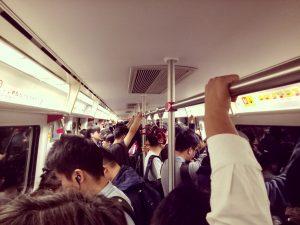In China, Guangzhou, during dinner in Buddha World (佛世界饭馆) with my Chinese girlfriend, the topic of Chinese work rights arose.
“By the way, my work has changed the schedule again,” she explained. “I only have one day off every week for the next four weeks.”
It is no longer a surprise to me, to hear how work demands so much more from its Chinese employees in terms of overtime (加班).
Calculating Time Off On Chinese National Holidays
I asked, “Why do you have to work so hard at the Chinese teaching academy in the next few weeks?”
She said, “Because it is winter break. Chinese people only have this period to have a holiday and take time off from school, so what Chinese students normally do on their holidays is to learn more. That is why as teachers we work more in those days. It is only a small amount of time.”
Work rights in China are a painful topic. Gainful employment is at the top of the needs pyramid, often taking precedence over family, relationships and lifestyle in China. Teaching Mandarin to young Chinese preschool students is no easy task for my girlfriend either.
I asked, “When are you going to get those three or four days back?”
She said, “We will get that time back when the holidays come up at Spring Festival.”

City Vs Rural Work Rights
The irony is that for Spring Festival, all Chinese people get around eight days off for the holiday period.
I laughed, “So your work is going to offer to take away your weekend holidays so that they can give you holiday time back on your Chinese national holidays?”
She laughed at me, “No, normally Chinese workers only get four days off for Spring break. But my school has factored in that us teachers will have eight days off. The school knows that the teachers will be working extra time in the weeks leading up to Spring Festival.”
I smirked, “That work arrangement sounds similar to countryside folk (农村人) who come from rural areas to Guangzhou city to work. Those Chinese people from the countryside only get four days off work.”
She explained, “Those Chinese people can quit their jobs whenever they want. They can go back to the countryside, but I can’t.”
China vs Hong Kong Work Opportunities
We also talked about employment opportunities in Hong Kong. My Chinese girlfriend lived in Hong Kong for a few years.
I asked, “Why didn’t you find work and stay in Hong Kong?”
She explained, “I was only in Hong Kong for six months. I couldn’t find a job. The competition was even fiercer in Hong Kong.”
As a Westerner, the topic of work rights in China often leaves me baffled as to why Chinese slave themselves for their work. I once again was reminded over the dinner table as to the reasons why Chinese people do not think twice about the sacrifices they make for their employers.
In Australia, holidays are determined on a national level. Gainful employment in Australia is not so fundamental to mortal existence that that one needs to work endless overtime and sacrifice family or leisure time to appease a boss, or to help make the business more money.
Flexible employment is possible in Australia and other Western countries. Personally, I would be as happy working full time in an international company in Australia from Monday to Friday, 9am to 5pm, as I would be working as a casual on-call contractor a few days a week for a labour hire company.


Diary Of A Mad Chaos is a daily diary written from March 1996 until today, of which individual books and book series have been created, namely “The Lost Years” an exploration of young, entwined love, the “Wubao In China (猎艳奇缘)” book series which provides an extensive comparative analysis of the cultural differences between Eastern and Western societies, and the book titled “Foreigner (华人)” an exploration of race relations in Australia.










